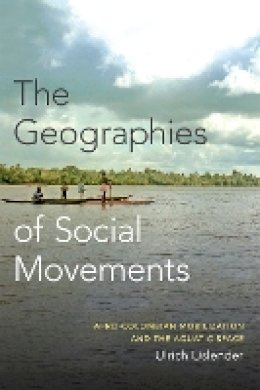
Stock image for illustration purposes only - book cover, edition or condition may vary.
The Geographies of Social Movements: Afro-Colombian Mobilization and the Aquatic Space
Ulrich Oslender
€ 120.08
FREE Delivery in Ireland
Description for The Geographies of Social Movements: Afro-Colombian Mobilization and the Aquatic Space
Hardback. In The Geographies of Social Movements Ulrich Oslender examines the activism of black communities in the lowland rain forest of Colombia's Pacific coast to show how the mutually constituting relationships between residents and their environment informs the political process. Series: New Ecologies for the Twenty-First Century. Num Pages: 304 pages, 23 illustrations. BIC Classification: 1KL; HBJK; JHMC. Category: (G) General (US: Trade). Dimension: 240 x 232 x 23. Weight in Grams: 574.
In The Geographies of Social Movements Ulrich Oslender proposes a critical place perspective to examine the activism of black communities in the lowland rain forest of Colombia's Pacific Coast region. Drawing on extensive ethnographic fieldwork in and around the town of Guapi, Oslender examines how the work of local community councils, which have organized around newly granted ethnic...
Read moreProduct Details
Format
Hardback
Publication date
2016
Publisher
Duke University Press United States
Number of pages
304
Condition
New
Series
New Ecologies for the Twenty-First Century
Number of Pages
304
Place of Publication
North Carolina, United States
ISBN
9780822361046
SKU
V9780822361046
Shipping Time
Usually ships in 7 to 11 working days
Ref
99-50
About Ulrich Oslender
Ulrich Oslender is Associate Professor of Geography at Florida International University and the coeditor of Bridging Scholarship and Activism: Reflections from the Frontlines of Collaborative Research.
Reviews for The Geographies of Social Movements: Afro-Colombian Mobilization and the Aquatic Space
"Readers from geography, sociology, resource management, sustainability, Latin American studies, peasant studies, political science, and related fields will find value in this work."
Joseph L. Scarpaci
AAG Review of Books
"Oslender masterfully ties different threads together to form a compelling argument about the importance of place and space in charting social movement. . ....
Read moreJoseph L. Scarpaci
AAG Review of Books
"Oslender masterfully ties different threads together to form a compelling argument about the importance of place and space in charting social movement. . ....
